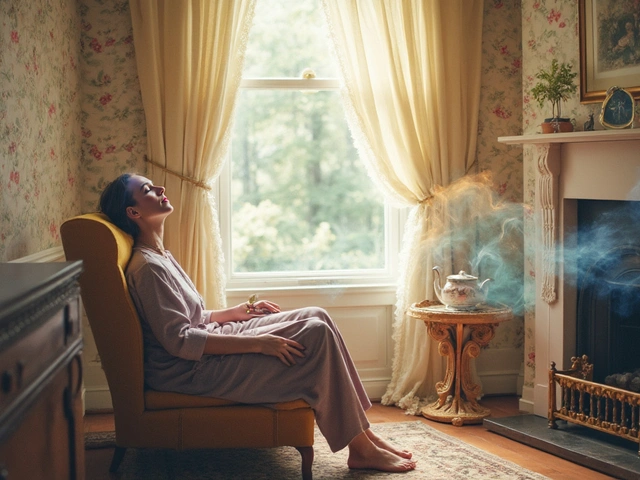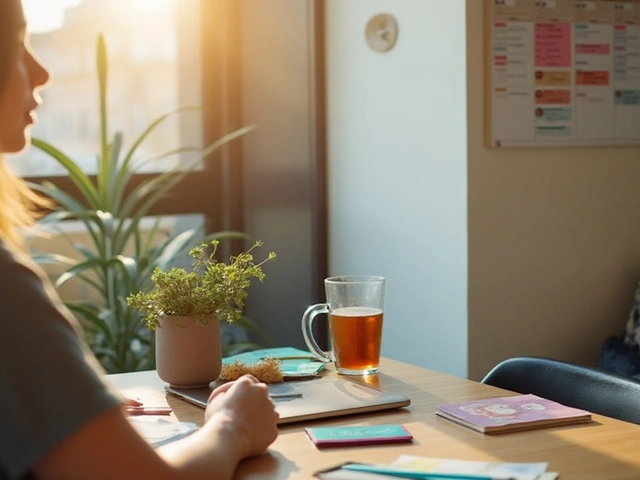Anxiety disorders: practical tools for everyday relief
Anxiety disorders are more than worry. They hijack your day, make simple choices feel huge, and show up as tight chest, racing thoughts, or restless sleep. If that sounds familiar, you can learn clear steps to feel steadier. This page pulls practical, science-friendly tools you can use right now and points to deeper help when you need it.
Short-term fixes
Work fast. When panic starts, try box breathing: inhale four seconds, hold four, exhale four, hold four. Repeat until your heart slows. Grounding helps too — name five things you see, four you can touch, three you hear, two you smell, one you taste. Both techniques shift your nervous system away from fight-or-flight.
Move daily
— brisk walks, yoga, or short workouts lower stress hormones and clear your head. Keep sleep regular: same bedtime and wake time, dim lights an hour before bed, and skip screens that wake your brain. Eat balanced meals and avoid too much caffeine; stimulants can boost anxiety.
Mental habits matter. Try a simple worry window: give yourself 15 minutes each day to worry, then close the window. This trains your brain to limit anxious loops. Journaling helps — write one worry, then list one action or one fact that counters it. Small actions break the "what if" chain.
Therapies and tools that help for the long haul. Cognitive-behavioral therapy (CBT) is a top choice: it rewires how you respond to anxious thoughts. Mindfulness and daily meditation build tolerance for discomfort and reduce reactivity. Creative arts therapies like art or music can express hard feelings without words. For some people, medication prescribed by a clinician can provide stability while other strategies take hold.
When to get professional help. If anxiety stops you from working, sleeping, or leaving the house, seek a therapist or doctor. If thoughts include harm to yourself or others, contact emergency services right away. A trained clinician will sort out anxiety type and create a plan that fits your life.
Small, consistent steps add up. Start with one short habit — a five-minute breathing break, a nightly walk, or a worry window — and stick with it for two weeks. Notice what changes. If a technique helps even a little, keep it and try another.
You don’t have to fix everything at once. Anxiety disorders are common and treatable. Use quick tools for immediate relief, build daily habits for steady progress, and ask for help when life feels stuck. If you want, check the linked articles on mindfulness, relaxation techniques, creative arts therapies, and when to see a pro for more practical guides.
Helpful tools to try today include a simple meditation app for guided sessions, a sleep tracker to spot patterns, and a mood journal. If anxiety affects daily tasks despite these steps, ask your doctor about therapy options or medications as a temporary boost while you learn new coping skills. Small changes add up faster than you expect. Start today and track one clear win.
The Link Between Health Anxiety and Mental Health
Alright, my lovely readers, let's dive into the fascinating world of our minds! So, the link between health anxiety and mental health might seem as tangled as a ball of yarn, but it's really quite simple! When we're constantly worried about our health, it can throw our mental health for a loop-de-loop! It's like a never-ending rollercoaster ride that can lead to conditions like depression or anxiety disorders. But, hey, remember, it's all about balance, so let's keep our worry-warts in check and focus on fostering a fabulously healthy mind and body!
View More10 Common Misconceptions About Health Anxiety
Alright, my lovely readers, let's tackle this fascinating topic of health anxiety. Hold onto your seats because we're about to debunk some major misconceptions! First off, health anxiety isn't just about being a "hypochondriac" - it's a legit condition that deserves understanding, not judgement. It's also not just about WebMDing every symptom (though we've all been there, am I right?), it's a complex state of mind. Lastly, people with health anxiety aren't just looking for attention, they're dealing with real fear and concern. So, let's spread a little empathy and understanding, shall we?
View More






